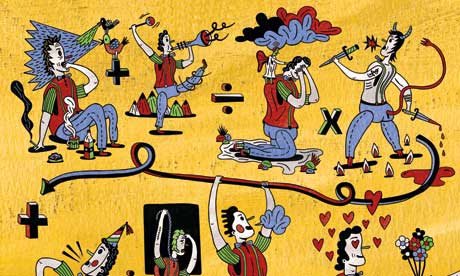-

-
This column will change your life: emotions as equations
Can all your problems be solved by simply getting your sums
The formulas provide clarity, but that's
not to say the solutions are easy. Click on the image for the full
picture. Illustration: Phil Wrigglesworth for the Guardian
Yet a recalculation is in order, because it turns out the book, out now in the US and published in Britainin April, contains a valuable kernel of an idea. Conley was forced to confront his previously ignored emotional life when he lost a friend to suicide, then suffered seemingly work-induced heart failure; perhaps these experiences explain why his "emotional equations" are far less glib than the label implies. After Viktor Frankl's Holocaust memoir, Man's Search For Meaning, got him through a very dark period, Conley concluded that its message was "despair = suffering - meaning", an elegant distillation of Frankl's insight that extremes of anguish need not destroy the soul if a sense of purpose, and of choosing the meaning of one's experiences, remains. (Admittedly, Nietzsche put it better: "He who has a why can bear with almost any how.") Meanwhile "suffering = pain x resistance" arguably pinpoints the essence of Buddhism: pain may be unavoidable but suffering is optional, and it's the product of struggling against pain.
This way of thinking about emotions isn't exactly new: like much of psychology, it was probably invented by William James, who famously described self-esteem as "success divided by pretensions" – that how good you feel about yourself is the ratio of life-goals achieved to aspirations. Cognitive therapists sometimes express their approach algebraically, too – "emotions = events + beliefs about events" – which neatly clarifies the point that it's not events alone that trigger distress, but rather events combined with our interpretations of them.
At their best, Conley's equations prompt a revelation: by reducing an emotional problem to its core elements, you can glimpse new ways to address it. If "workaholism = what you are running from ÷ what you are living for", it's starkly apparent that there are two ways to combat it: face whatever you're using it to avoid, or actively create meaning elsewhere. If "happiness = wanting what you have ÷ having what you want", you can either reduce your desires (tricky) or focus on boosting your gratitude (much more doable). If "suffering = pain x resistance", you have two options for alleviating it: reduce pain, or reduce your resistance to the situation, aka practising acceptance. The formula provides clarity, which isn't to suggest the solution is easy.
Finally, Conley writes, "wisdom is the square root of experience". Ponder that. It's either gobbledegook or the most profound philosophical insight I've encountered in a while. I'm not sure which – mental arithmetic never was my strong point.
Source:
http://www.guardian.co.uk/lifeandstyle/2012/jan/27/change-your-life-emotions-as-equations

